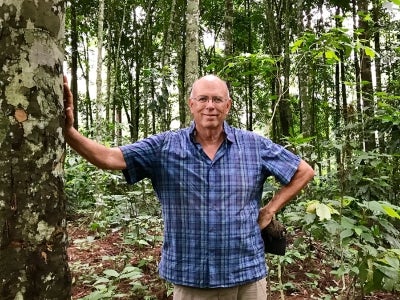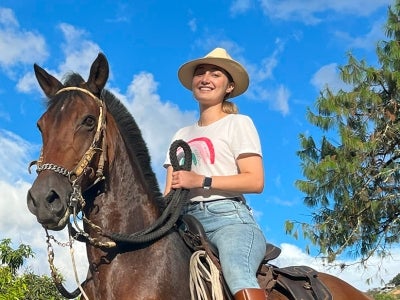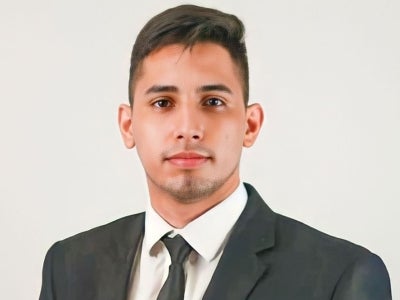Tom Bui speaks in front of an audience at a World Refugee Day event in Canada
Tom Bui is Director of Environment at Global Affairs Canada, and represents Canada on the Global Environment Facility’s governing body, the GEF Council. In an interview, he shared what most inspires him about working at the intersection of humanitarian, economic, and environmental action, and reflected on how his childhood experience as a refugee to Canada shaped his approach to work and life.
Which constituency do you represent at the GEF Council? What is your “day job”?
I represent Canada on the GEF Council. As Director of Environment at Global Affairs Canada, I am on both the GEF Council and the Green Climate Fund Board. My team leads on climate change policy, international biodiversity policy and programming, oceans programming, and environmental integration at Global Affairs Canada.
How did you get into this line of work? What do you like most about it?
I have focused on humanitarian, international protection, international debt and finance, international development, and development finance issues since 1997. My current day job is just part of this long journey for people and planet.
What are the Government of Canada’s top priorities when it comes to the environment and environmental diplomacy?
Canada has signed onto the Leaders’ Pledge for Nature and the High Ambition Coalition for Nature and People to accelerate action against climate change and biodiversity loss. At the One Planet Summit this year, Canadian Prime Minister Justin Trudeau said that because we cannot fight climate change without nature-based solutions, any future global climate finance contributions from Canada will include funds for biodiversity. Guided by Canada’s Feminist International Assistance Policy, we engage closely with women and girls, indigenous peoples, women’s rights organizations, the private sector, and international organizations. We understand that women and girls and indigenous peoples are most vulnerable to climate change and biodiversity loss. And the GEF’s independent evaluations have found that women and indigenous peoples are also the most effective stewards of nature. Partnering with them to fight climate change and stem biodiversity loss therefore makes sense from both a poverty reduction and effective delivery of development perspective.
How has the COVID-19 crisis impacted these priorities, if at all?
COVID-19 has shown us that valuing, protecting, and restoring nature is good for human health by minimizing the risk of zoonotic diseases. It also puts greater emphasis on the global effort to rebuild better and greener.
Is there a GEF-supported project or program that is close to your heart?
I was privileged to contribute to the development and approval of the GEF’s first-ever Private Sector Engagement Strategy anchored in the logic of the innovations and partnerships, including blended finance, for people and planet.
As for projects, I know the GEF’s planetGOLD program since I directed a Global Affairs Canada artisanal gold mining project in Indonesia to eliminate the use of mercury in extraction processes. Both planetGOLD and Global Affairs Canada work with the same partner, the Artisanal Gold Council of Victoria, British Columbia. I have visited the partner in Victoria and discussed the positive impacts of these projects on artisanal miners, their families, and their communities.
I also appreciate the GEF Small Grants Programme which advances inclusive partnerships on the environment and nature. I particularly like their projects involving women as effective environment stewards across all of the GEF’s priority areas. As someone born in Hue, Vietnam, and a former Global Affairs Canada director for Vietnam Development, I always read with a smile stories about international organizations like the GEF supporting the women’s union of Hoi An to revolutionize waste management.
What lessons has your work life taught you?
My work life has been about putting people first instead of things. Happiness comes when one is useful and works to deliver meaningful results for the poorest, most vulnerable, and marginalized. In some ways, I am paying it forward for past human kindness I received over the years. As a former Convention refugee living for almost two years in the Philippines’ Palawan refugee camp as a ward of the United Nations, I benefited greatly from the Filipino nuns and Western volunteers who came to teach us English and other life skills. Before the camp, Dutch people rescued us after 20 days on the high seas. Following resettlement in Canada, there were the teachers and others in British Columbia who showed kindness to a little boy from Vietnam. Out of university, I could have asked my supervisor for a job with him at Wells Fargo. Instead, another kind professor suggested public service with a focus on international finance. From them, I learned loving kindness. From them, I learned that my “work” life could be my life. Since entering the public service, I have worked alongside great people to deliver durable solutions to refugees, abolish Third World Debt so countries could invest in a better future for their people, and now co-create solutions for people and planet as Canada’s Director of Environment at Global Affairs Canada. The Japanese have a nice word for this, ikigai.
GEF_Voices_Tom_Bui_immigration_manager.JPG
What do you hope to observe in the world by the time you retire?
I hope to see the world united in making concrete progress towards humanity being a part of nature and not its master.
What are you most looking forward to in 2021?
This year, I hope we’ll see the world united on the single agenda of COVID-19 response. We can rebuild better and greener by partnering to fight the twin crises of climate change and biodiversity loss in line with the Leaders’ Pledge for Nature.



